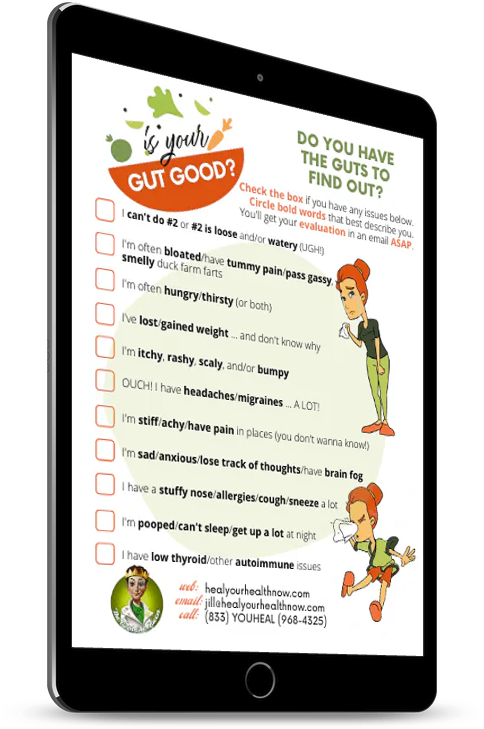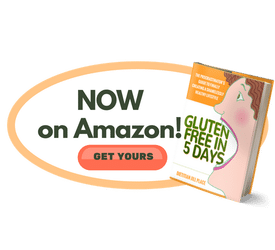 By Dietitian Jill
By Dietitian Jill
Good gut recipes for food alone are many. So I thought I’d talk about them individually. Here’s the first … Go Organic!
Choosing organic foods is one of the most powerful tools for healing your gut I know. It made me think that perhaps I should give you some really good … aww … not just that … TERRIFIC reasons to go organic. Seven SUPER Reasons …
Yeah … yeah … you’re going to tell me that organic foods are too expensive … that they’re too inconvenient to buy … I don’t really need them … yadda yadda.
But that’s just a lazy cop-out. There are plenty of ways to get organic foods cheaper. And plenty of convenient places to find them. Here are a just a few …
- Markets like Trader Joes and Sprouts … also buy market store brands (my Albertson’s has tons of organics)
- Online services like ButcherBox.com and ThriveMarket.com.
- Farmer’s markets
Organics are free of GMOs
A loooonnng time ago (yes, I do remember back that far) when GMOs (Genetically Modified Organisms) were first globally proposed, they sounded like a great idea. Bigger, plumper tomatoes. Juicier beef. And longer shelf lives.
But when GMOs were first introduced, they said they’d label them so consumers could have a choice. They skipped that step.
I remember … pre-COVID at the corn farm stand … another shopper asking me if the corn was non-GMO. I said, “GOOD LUCK!”
Corn was the first GMO crop. And I don’t even know where I can get fresh organic cobs. As many “non-GMO” claims, even those at Whole Foods and Farmer’s Markets, are bogus.
The reality is that we currently don’t know which fresh foods are really non-GMO. Because they skipped that step.
Even more troubling … we don’t know the long-term effects of GMOs. Not only that, they’re often engineered to be used in conjunction with a single harmful chemical. Like Round Up, which has been proven to cause cancer and is banned in many countries.
Eating organic (it needs to be certified … and in California we’ve had organic legislation since the early 1990s) is not only healthier. But eating it is a political warning to large chemical corporations to stop polluting the world’s food and fields.
Eat Organics … Eat Less Pesticides
Pesticides do horrible things to the body. One of the things they HAVE done to us is to make us fat!
According to the CDC (Centers for Disease Control), the prevalence of obesity has increased between 2000 to 2018 from 30.5% to 42.4% and severe obesity from 4.7% to 9.2%. And the cause is way beyond eating more and exercising less.
I even wrote an article about the problem, called Can Obesogens Make You Fat?. A recent Duke University article explained,
DDT, neonicotinoids, and organochloride pesticides are all examples of pesticides that behave as obesogens. Their ability to accumulate in human fat tissue enables a disruption in the endocrine system, increasing sensitivity to metabolic disorders.
Obesity is only one of the problems pesticides can cause. In the case of glyphosate, also known as Roundup, $8.8 billion to $9.6 billion was provided to resolve roughly 75 percent of the roughly 125,000 filed and unfiled claims.
Brought by plaintiffs who blame exposure to the development of non-Hodgkins lymphoma.When I see ads urging people to spray Roundup on their unsuspecting plants, I want to throw organic fruit juice on my TV screen.
And, unfortunately, some of my fellow RDNs are in Monsanto’s (the Roundup manufacturer) pocket. And are constantly blasting those of us who embrace healthy alternatives.
 Organic Farming Promotes a Healthier Environment
Organic Farming Promotes a Healthier Environment
“Organic farming is a way to … work with nature rather than dominate her“, shares Ric Bowers, an organic farmer and consultant. This type of agriculture works with and promotes sustainable farming practices that enhance biodiversity, strengthen soil health, and deal headlong with climate change while also adapting to it.
Practices, such as rotating different crops on the same land, strengthen biodiversity in the environment. And biodiversity, which promotes a healthy, sustaining environment, reaches far beyond just growing food or animals. Organic practices contribute to the health of our planet itself.
The loss of biodiversity is hazardous not only to the planet, but also to the livings and food security of its people. Non-organic foods are sprayed with extremely toxic chemicals and fed with synthetic fertilizers that pollute the soil, water, air, and living organisms that depend upon them.
It is often said that even organic farms in my home agricultural state of California are polluted by these horrible practices. I’m not surprised.
Perhaps this whole mess is partially responsible for the high instance of autoimmune problems many are suffering with today. By polluting our farms we’re polluting ourselves.
So going organic not only reduces the toxic load of our outer environment … which more and more is making us sick. But also reduces inner toxins … and helps your body heal your gut.
 Organics Squash Superbugs and Grow Good Ones
Organics Squash Superbugs and Grow Good Ones
Nature is great at adapting to any situation. And the more we spray, the more bugs adapt (many say the current strain of COVID is not the one we started with).
Until we get to the point where we don’t have the chemicals to kill them … and they become superbugs.
Research published recently in Environmental Health Perspectives, focused on methicillin-resistant Staphylococcus aureus (MRSA) in hog slaughtering and processing plants to look at how exposure was spread to plant workers, their household members, and community residents. Researchers found that plant workers were exposed to antibiotic-resistant strains of bacteria at rates 2.5 times higher than typical community residents.
Other statistics from the CDC show that more than 2.8 million antibiotic-resistant infections occur in the U.S. each year, and more than 35,000 people die as a result. In addition, 223,900 cases of Clostridioides difficile occurred in 2017 and at least 12,800 people died.
Organics provide balance in nature. An Earthbound Farms article explains …
An infestation can wreak havoc on an organic farmer’s year, but when it comes to insects, beneficial insects like the lovely lady bug, the sensational syrphid fly, or the lively lacewing (all “good bugs”) are key to helping us control the pest insects like aphids and thrips (“bad bugs”).
It’s another way that organic farmers work with the natural ecological order to grow strong, healthy crops. Beneficial insects help us by eating adult pests, eating pest eggs, or by becoming parasites inside pest insects themselves.
 Organic Foods are Often More Nutrient-Rich
Organic Foods are Often More Nutrient-Rich
Non-organic crops get their nutrients from synthetic fertilizers made from fossil fuels. On the other hand, organics are grown in nutrient-rich soils that pass these nutrients on to the plants that we eat.
According to an article in Alternative Medicine Reviews,
Reviews of multiple studies show that organic varieties do provide significantly greater levels of vitamin C, iron, magnesium, and phosphorus than non-organic varieties of the same foods. While being higher in these nutrients, they are also significantly lower in nitrates and pesticide residues.
In addition, with the exception of wheat, oats, and wine, organic foods typically provide greater levels of a number of important antioxidant phytochemicals (anthocyanins, flavonoids, and carotenoids) … in vitro studies of organic fruits and vegetables consistently demonstrate that organic foods have greater antioxidant activity, are more potent suppressors of the mutagenic action of toxic compounds, and inhibit the proliferation of certain cancer cell lines …
 Organic Foods Taste Better
Organic Foods Taste Better
Non-organic animals are raised packed together in factory farms with inhumane practices, such as cutting the beaks off chickens. And slaughtered under similar conditions. Which leaves them horribly stressed.
The meat of a stressed animal is not as tasty and tender as the meat of a relaxed free-range animal. An animal slaughtered under more humane conditions.
Similarly, plants grown with ease and in nutrient-rich soil are tastier. As described in the above research …
- Organic crops have healthier diets of nutrients from the soil. And soil microbiomes that help crops easily absorb nutrients.
- Natural forms of nitrogen help the plant absorb them slowly the way nature intended. Synthetic, petroleum-based fertilizers are, on the other hand, a shock to their delicate systems.
- Organic crops also have a higher ratio of solids to water. Which leave the flavor undiluted and … frankly … MWAAH!
 Organics don’t Cost Taxpayers Millions of Dollars
Organics don’t Cost Taxpayers Millions of Dollars
Non-organic farming practices cost taxpayers millions in subsidies in America. Not to mention additional millions cleaning up the multi-messes they cause.
Red flag all around? I say yes.
Oh … and if you read the comment below, Janet Sauerwein had this to say about organic foods “I know these to be facts. My daughter was slipping inorganic produce into my shopping cart for about 2 months & it caused several problems for me. She won’t be doing that again!” Thank you Janet!




I know these to be facts. My daughter was slipping inorganic produce into my shopping cart for about 2 months & it caused several problems for me. She won’t be doing that again!
Janet … thanks so much for this comment. Share with us what problems it caused if you will. As you can see, I’m a BIG advocate of organic food for maintaining health. I’m 75 and still going … healthy and happy!